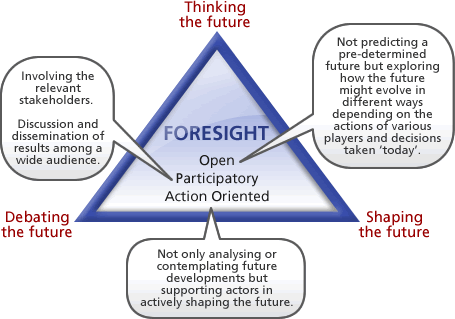I was 23 years old when I took a decision that would change my life forever – move to Houston, Texas-USA from Bordeaux, France to further my studies in a field called Studies of the Future. A bold decision but one I knew would give me the skills I needed to start my professional career. At that time, very few people knew of the field of Foresight, Future Studies or Alternative Futures as it is often called. And Clear Lake was the only campus of the University of Houston that offered such a degree in the entire United States! It was the perfect example of how innovation was brought to higher education and it lives on with Teach the Future, an initiative to bring futures thinking to students of secondary, post-secondary and professional education institutions.
The use of systems approach to understand the interconnections, relationships and cause and effects of pretty much anything around us; the development of scenarios for alternative futures; strategic planning; visioning or visualization of possible outcomes; and the theory of social change are some of the skills that I have learned and that are still today very important to any successful business. Some businesses like Chrysler have incorporated futures thinking into their organizational structure making it integral to their business while others like Nike and Skype have used it to create entirely new business models that have revolutionize their field. Having worked in the development field for 13 years now, I’ve always asked myself how different would multilateral development banks (MDBs) be if they were to incorporate innovation into the way they do business. Here are three ways MDBs can innovate using the skills of foresight.
- Use technology to improve the quality of reporting and get rid of written reports. Let’s face it, agencies that implement development projects take a long time to provide written reports and the providers of development financing have to demonstrate the positive impacts of their interventions to their constituencies. Using existing technology, MDBs can already bring innovation to the way reporting is done on the activities financed and results achieved. They can use tools such as Skype calls, Go-to meetings, Web-ex, Webinars, videos and scanned documents to record meetings focused on (live) reporting about the same activities and results achieved. Why does it have to be written to be valid? The digitalization of information can certainly transform reporting and how institutions develop and manage their corporate knowledge base. This can bring benefits such as: faster report on progress as implementing agencies do not have to spend days/months working on a written report; better quality of information as MDBs can ask for clarifications on the spot and for evidence from beneficiaries who can be invited to the meetings; and an amazing source of knowledge material that can be used to demonstrate results, promote development and disseminate lessons learned (good or bad).
- Apply strategic planning to be more efficient by removing hierarchical structures. A solid strategic planning exercise would certainly conclude that to be a valuable partner to developing nations facing globalization and an ever-changing environment, MDBs have to be more flexible and adaptive. One way this can be done innovatively is through changing MDBs’ organizational structures and human resources management by having modular teams as a basis to deliver projects instead of their current heavy and costly hierarchical structure. Teams can be set up per project, initiative, task, country, region etc. and staff allowed to bring their expertise and knowledge to different teams when it is in the interest of the institution, the individual and the client. For instance, a water and sanitation specialist can be interested in providing support to a project in agriculture or in a different country and the addition of this specialist to the project team could provide new solutions and results. Innovation and creativity from carefully chosen and evolving teams are bound to happen and will result in higher social impact as long as the ultimate goal of improving people’s lives is kept in sight, achieved and shared by everyone.
- Introduce systems approach to have greater impact by focusing on providing access and not just providing money. If we were to use systems approach to draw the network diagram of development challenges, we would find out a high number of inter-dependencies, complexity and a large number of stakeholders. If MDBs were to change their focus to providing access to basic human needs to those who still lack access to them, their approach would be more inclusive, sustainable and reach more beneficiaries. Let’s explore how this would work by looking into the challenge of youth unemployment for instance – instead of focusing mainly on providing money to governments so that they can put in place processes to increase youth employment, MDBs would look at the ecosystem of youth unemployment and work with all relevant stakeholders to provide youth with access to employment opportunities. Stakeholders include educational and vocational institutions, the private sector and civil society organizations to name a few. Imagine what this coordinated approach would do to foster not only employment but also youth entrepreneurship as a solution that can reach more youth and provide a more sustainable solution. The Inter-American Development Bank has analyzed the differences between youth who become entrepreneurs by necessity or by opportunity, and has also reviewed the scope and quality of programs that governments, development agencies and civil societies are implementing to support young entrepreneurs.
These are just a few examples of how MDBs can introduce more innovation through futures thinking into the development field to improve people’s lives. If you were to “Walk the Talk” of innovation, what would be your thought-provoking ideas?
Follow us on Twitter: @IDB_CarDevTrend


Nice blog Christeel! Cheers, Florencia
Great post, Christel! I agree 100% with point#1 re: simplifying reporting and taking full advantage of technology. Out-of-the-box thinking in action!